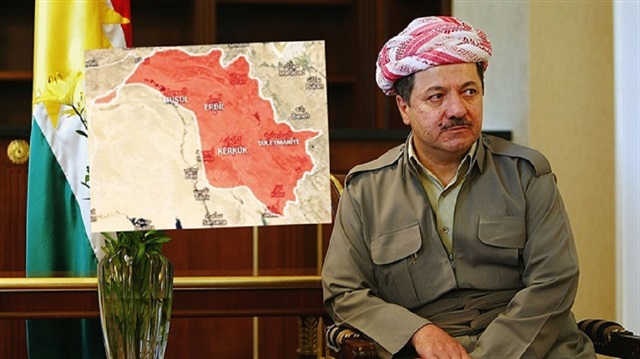
KRG President Masoud Barzani aims to cause regional destabilization with the scheduled referendum in an attempt to turn northern Iraq into a hotbed for terrorist organizations such as the PKK and Daesh
The Kurdistan Regional Government (KRG), despite warnings from the international community, including Turkey, Iran, Iraq and the U.S., is insisting on the referendum that will cause regional instability.
Experts warn that the referendum will spark new crises and cause destabilization, as well as benefit terror organization and war lobbies. It is certain that the Iraq central government will not accept the KRG’s wishes to become an independent entity.
Iraqi Prime Minister Haider al-Abadi’s statements and the Tal Afar operation, as well as the region’s international importance indicate that Baghdad, Ankara and Tehran will not remain silent.
Experts claim that the situation in northern Iraq will strengthen ties between Ankara and Tehran, and enable the two nations to put aside their differences and to take up a common stance.
The strongest reaction will come from within Iraq, and the Kurdish independence move could ignite an Arab-Kurdish ethnic war.
The referendum decision in northern Iraq as well as the Kurdish region in Syria combined with the attempt to divide Syria has caused Iran and Turkey to work more closely together.
Iran, which is expected to deliver a strong response to Barzani’s move, is acting with the concern that the move could destabilize the region. Iran fears that the independence of the KRG will encourage the Kurds within the area, and that a possible independent territory would become a U.S. pawn.
Iran fears that the U.S., which has established many military bases and has settled into the region militarily, could take steps to threaten Iran without having to negotiate with Ankara or Baghdad.

Istanbul Kültür University academician Asst. Assoc. Dr. Bora Bayraktar notes that although the Kurdish independence effort of Iraqi Kurds is portrayed to be multi-dimensional, very effective, and a very uncontrollable issue, regional countries and global powers are also involved in the process.
Bayraktar, who stated that the central government of Baghdad will use military force to regain controversial territories against this initiative of independence, said: "The controversial points around Kirkuk, Hanekin and Mosul seem to be the first lines of the front. This ethnic war can also manifest itself between the PYD and the Syrian regime. With the operation of Tal Afar, the KRG will only be able to exist with U.S. air support as the Iraq-Syria, as well as Iranian and Turkish, borders close. The U.S. will have to choose between the Kurdish administration and the Iraqi central government in order to continue its relations with Baghdad. The truth of the matter is very complex and the options are not very bright in terms of the region. The only way to prevent this is to abandon the referendum.”
Masoud Barzani, who completed two terms as president of the KRG, believes that he can maintain his position with the notion of independence and the referendum. Some groups, including the Gorran Movement (Movement for Change), believe the timing of the referendum is not appropriate.
The Gorran Movement, which is the official opposition to the ruling two-party coalition of the KRG, opposes the referendum and believes the matter should be resolved in parliament.
Barzani plans on winning the parliament elections with the momentum of the “Yes” vote in the referendum.

Foreign Minister Mevlüt Çavuşoğlu on Wednesday called on Iraqi Kurds to cancel a planned independence referendum scheduled for next month.
“Our expectation from Erbil is quite plain and clear: this referendum decision should be cancelled,” Çavuşoğlu told reporters at a joint news conference alongside his Iraqi counterpart Ibrahim al-Jaafari in Baghdad.
He said that he arrived in Baghdad to underline the importance of Iraq’s territorial integrity and political unity, adding that Iraq’s “unity and solidarity” would also benefit Kurds.
Describing Daesh and the PKK as “common enemies” of both countries Çavuşoğlu said: “The PKK, just like Daesh, is a threat to Iraq’s territorial integrity, its peace, unity and stability.
The PKK is listed as a terrorist organization by Turkey, the European Union and the United States.
The PKK has been conducting armed violence in the southeastern part of Turkey since 1984. More than 40,000 people, mostly civilians, have been killed in the three-decade long conflict.
“We will act together [with Baghdad] to purge the PKK from Iraq and will give every kind of support to the Iraqi forces."

Regarding economic relations between the two countries, Çavuşoğlu said that Turkey would host a meeting of the Turkey-Iraq High-Level Strategic Cooperation Council.
The Turkish foreign minister also stated that Ankara would contribute to rebuilding all the destroyed Iraqi cities, particularly Mosul.
Çavuşoğlu praised Iraqi army efforts to recapture the northwestern city of Tal Afar from Daesh, saying that Turkey would continue supporting Baghdad against the terror group.
As part his official visit, Çavuşoğlu held talks with Iraqi President Fuad Masum and Turkmen lawmakers in Baghdad. Later, Çavuşoğlu met KRG President Masoud Barzani in Erbil.





